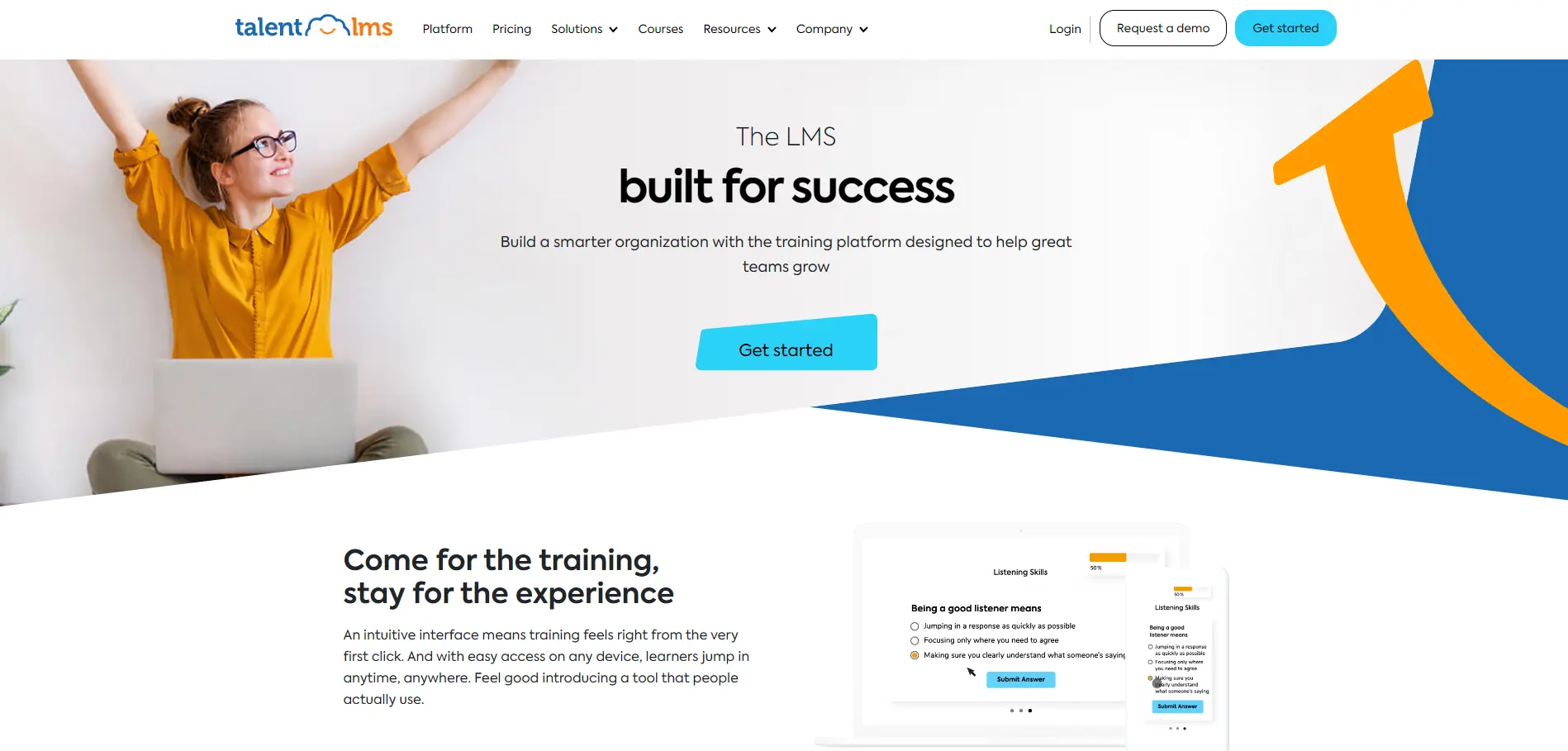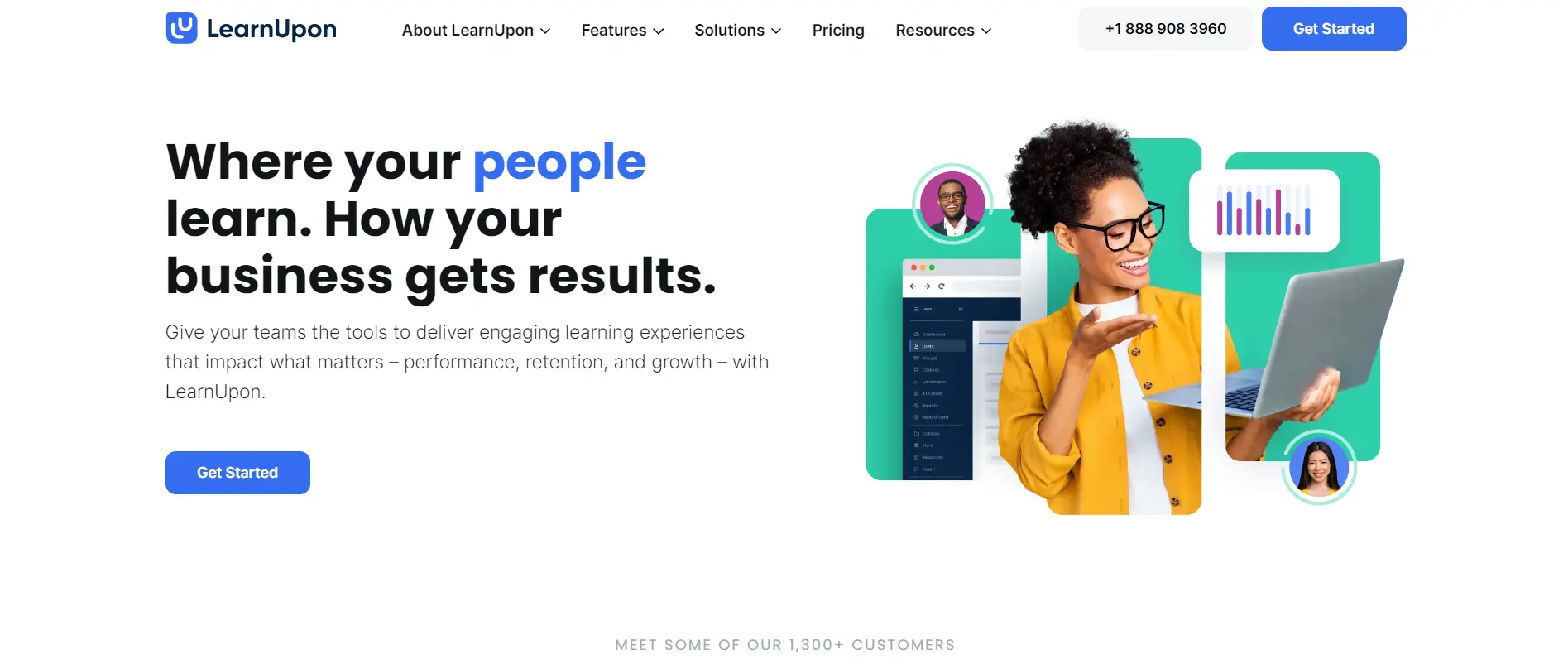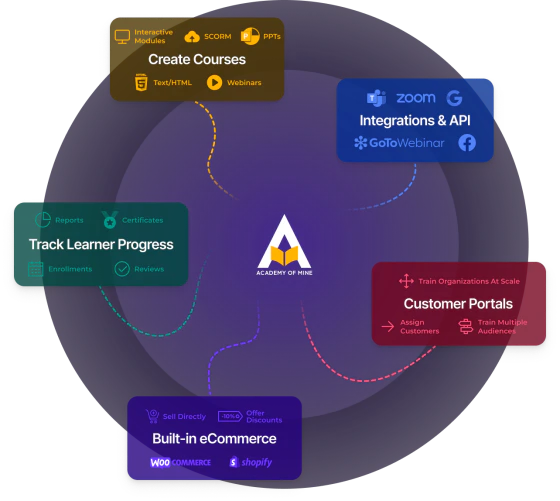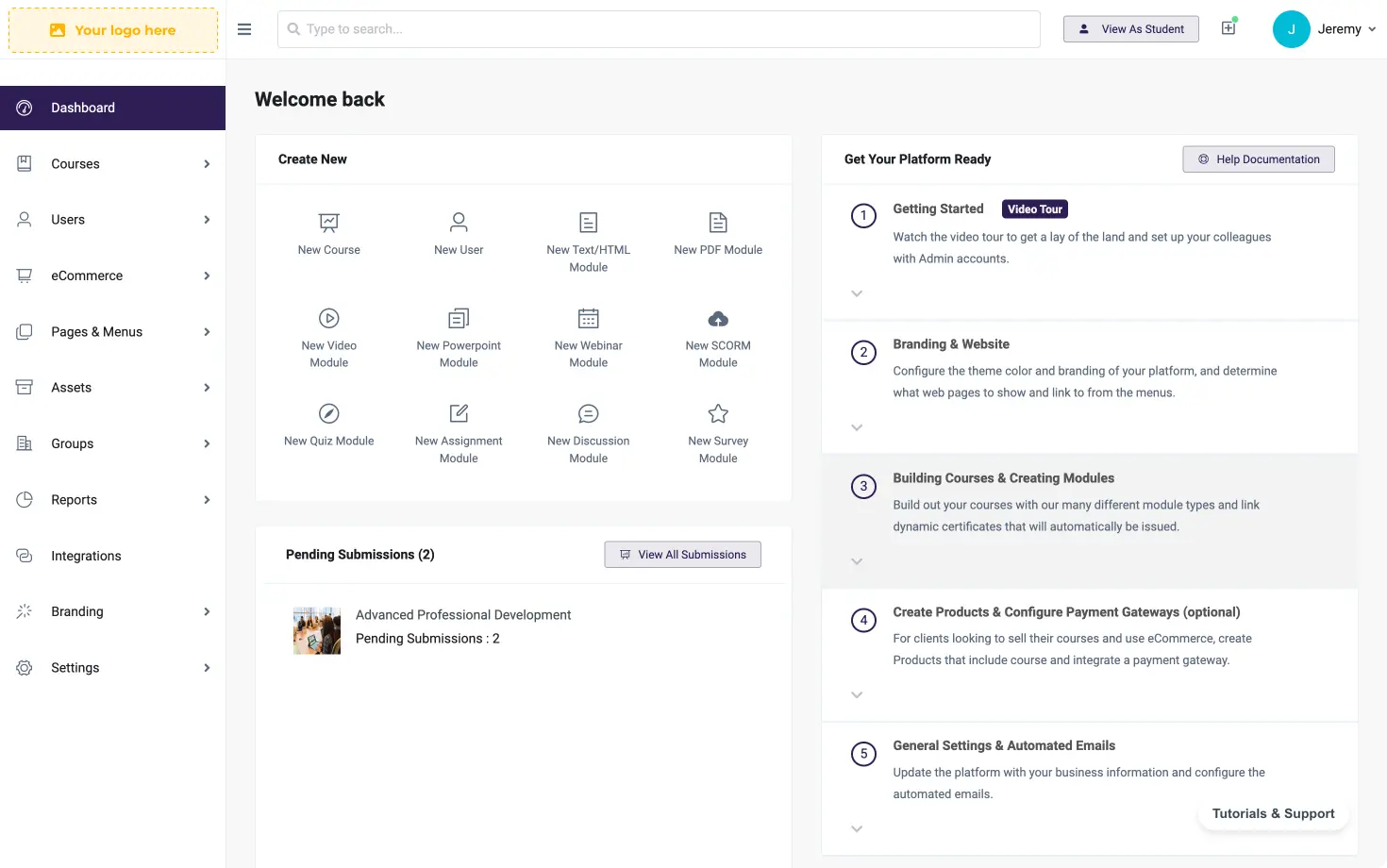Learning Management-System, Compliance Training
5 Best Compliance Training Platforms for Employees

Compliance training is a powerful tool for increasing on-the-job safety, preventing lawsuits, and boosting employee performance…when it’s done right.
The problem is that a lot of compliance programs aren’t executed well — only 44% employees feel well-equipped to protect themselves and their company after completing a compliance training program.
To deliver more effective compliance training, it helps to have a great compliance training platform. Speaking of, in this post we’ll be introducing you to the five best learning management systems for compliance training!
What Is a Compliance Training Platform?
Let’s start with the basics.
Compliance training is training that’s mandated by laws, regulations, or policies. Compliance training is heavily regulated in industries like finance, healthcare, and manufacturing, though this type of training exists in most industries. Its purpose is to help employees get acquainted with any rules, regulations, standards, and/or best practices they’ll be expected to comply with on the job.
A compliance training platform is a tool, almost always a learning management system (LMS), that businesses can use to manage compliance training at scale. There are usually a range of features under the hood, including:
- Content Management: For creating and organizing compliant training materials and programs.
- Training Management: For handling enrollment, scheduling, headlines, and reminders.
- Training Delivery: For delivering instructor-led, virtual instructor-led, and self-paced training programs according to requirements.
- Certification: For creating, tracking, and authenticating mandatory certifications.
- Analytics & Reporting: For demonstrating compliance, maintaining records, and staging on top of retraining and re-certification.
All-in-all, compliance training tools make life a whole lot easier for trainees, instructors, and administrators alike by giving all compliance-related programs and resources a shared home.
Why Are Compliance Training Platforms Important?
There are an absolute ton of benefits that come along with using a reliable compliance training platform.
Here are a few of the biggest:
1) Deliver Training Content Anywhere
A compliance training platform allows you to create content that’s accessible anywhere with an internet connection and a computer or smart-phone. This gives your employees the flexibility to fit compliance training seamlessly into their day-to-day routines. Compliance training management platforms like Academy Of Mine are mobile-friendly, and some systems even have mobile apps.
2) Performance Reporting
Another major benefit of using a compliance training platform is the ability to track, report on, and analyze compliance training data. An obvious use case for this is audits—when regulators ask to see evidence that employees have been trained. In this case, it’s as simple as exporting and sharing the data file with stakeholders.
3) Lower Training Costs
Finally, compliance training platforms cut down on costs by giving you a scalable training solution that can adapt to your growing needs. From adding new courses to expanding training programs and more, a good training platform is flexible and scalable.
Criteria for Choosing a Compliance Training Platform
We’ve covered the process of choosing an LMS for compliance training on the blog before, but here are the key takeaways:
1) Supports Blended Learning
Compliance training is usually mandatory because it deals with topics that have serious legal, financial, and, or safety ramifications when ignored.
Speaking of which, the best way to maintain compliance using online training is by ensuring that the online content is enjoyable and has variety. The easiest way to do this is by using Blended Learning, which is a method of teaching that uses a combination of face-to-face instruction and on-demand courses. Blended learning can include traditional in-person classes, but we’re mainly talking about on-demand courses (online), and instructor-led training which happens in real time. Compliance training platforms help companies schedule and manage virtual instructor-led training with integrations.
2) Certification Management
Certifications and compliance training often go hand-in-hand because accredited usually offer learners a certificate after completing a course. Certificates are rewarding to receive, but more importantly, they’re great to serve as proof that somebody has completely required compliance programs.
The LMS you pick should give you the ability to create and customize certifications with the required information and custom fields. You should also be able to monitor certification status to maintain compliance.
3) Integrations
Integrations are the bridge between your compliance platform and other software that you use regularly.
For instance, if you wanted to connect your HR system with your compliance platform, then you could manage all the data in one place. Meaning, your company would be able to maintain compliance and assign training to specific employees and departments, using one platform
See how an HR services company doubled its company size in 1 year, with Academy of Mine.
HRIS integrations are only one example, here are some other common LMS integrations:
- Video conferencing tools like Zoom and Microsoft Teams.
- CRMs like Salesforce and Hubspot
- eCommerce tools like Shopify and WooCommerce.
- Marketing attribution tools like FB Pixel, Google Analytics, and more.
4) Performance Reporting and Progress Tracking
Finally, you need to make sure your LMS keeps track of learner data and generates helpful reports about users’ progress.
Ideally, your platform should give you some standard reporting dashboards that automatically track employee training metrics important to you. If not, you need to make sure your compliance training platform lets you create customizable reports, to zoom in on the details of compliance that are important to your company.
What metrics do you need to report on? That depends on your needs, but here are metrics we commonly hear about from clients offering compliance programs:
- Track the time users spend with the material.
- Track quiz and test scores.
- Track detailed activity usage in classrooms and modules.
- Track average completion rates and certification records.
- Monitor engagement rates and when a user last logged in, and more!
- Store certificate records and course completions.
The 5 Best Compliance Training Platforms
In case you’re in a rush, here are the compliance training platforms we’ll be covering:
- Academy of Mine: Best Overall Compliance Training Platform.
- iSpring Learn: Best for Simple Compliance Training.
- EdApp: Best for Ready-Made Compliance Courses.
- TalentLMS: Best for No-Frills Compliance Training.
- LearnUpon: Best for Learner Engagement.
Now, let’s dive into the details to help you make the right choice.
1) Academy of Mine
Best Overall Compliance Training Platform.
Academy of Mine (AOM) is a powerful LMS designed with flexibility and user-friendliness at its core.

Businesses can create ILT or self-paced compliance training programs from scratch using AOM’s native authoring tools or upload existing SCORM courses to the content management system—complete with quizzes, assessments, multimedia, and more. Program administration is simple, with bulk uploads and self-registration options.
For tracking and demonstrating compliance, businesses can use AOM to keep tabs on progress and completion, issue certifications (including expiration dates and organization IDs), and generate standardized reports for stakeholders and auditors.
Plus, all your data is automatically backed up daily to prevent security issues.
Key Features
- Certifications: Create certifications with expiration dates and custom data fields to demonstrate compliance and keep your records up-to-date.

- Reporting & Analytics: Generate standardized reports on employee progress and program completion to share with stakeholders and keep our programs on track.

- Content Management: Upload or create SCORM-compliant self-paced, ILT, or VILT compliance courses complete with quizzes, assessments, checklists, videos, PPTs, PDFs, and more.
- Integrations: Integrate with a range of video conferencing tools natively and build custom integrations with flexible APIs.

- B2B Portals: For companies extending compliance training to other partner organizations and customers, the Academy of Mine platform has one of the best features in the market. Using Portals, you can create separate branded instances of training for each of your clients.

- Customizable Platform: Work with AOM’s in-house team to customize the platform to your specific compliance training needs, or dive into the code yourself.
Pros
- Highly customizable.
- Supports self-paced and instructor-led learning.
- Comprehensive reports and analytics.
- Supports certification.
- Supports extended enterprise training with Portals.
- Great integrations and flexible APIs.
- Fantastic customer service.
Cons
- Customization is a separate add-on service.
2) iSpring Learn
Best for Simple Compliance Training.
iSpring Learn is the LMS counterpart to iSpring’s well-known authoring tool.

It has a range of core features specifically designed to support effective compliance training, from flexible program creation tools to automated training management, solid reporting tools, the ability to certify employees and even mobile support.
One unique feature is the ability to create interactive compliance role-plays complete with point systems, branching decision trees, and voice-overs.
Key Features
- Content Management: Upload presentations (PPT), courses (SCORM), video tutorials (FLV, MP4), flash clips (SWF), audio (MP3, WAV), and documents (PDF, DOC, XLS).
- Pre-Built Reports: Track employee progress to demonstrate compliance and identify employees who need extra help.
- Certification: Upload a design or use a certificate template, track expiration dates, and re-enroll employees based on certification status.
Pros
- User-friendly interface.
- Mobile app for both iOS and Android devices.
- Interactive learning features.
Cons
- Built-in reporting features are fairly basic.
- Relatively poor integration potential.
3) EdApp
Best for Ready-Made Compliance Courses.
EdApp is a micro-learning platform that breaks compliance & safety training down into bite-sized pieces.

The tool covers pretty much all its bases, with features for creating courses and creating exciting learning processes with quizzes and activities, and a range of out-of-the-box reports for tracking progress, identifying learning gaps, and re-engaging employees who are falling behind.
That said, the standout feature is a library of 1,000+ ready-made compliance courses that you can customize to fit your needs. These range from common courses like food safety to more niche courses like confined spaces, blood-borne pathogens, crane safety, and more.
Key Features
- AI-Powered Course Creation: Use generative AI to create compliance training course content at the click of a button.
- Course Library: Access 1,000+ premade courses for immediate use or customization.
- Reporting & Certification: Track employee progress and award certifications for successful course completion.
Pros
- User-friendly interface.
- Great gamification options.
- Tools for tracking progress and c directly to instructors and trainers to provide targeted support.
Cons
- Customization options can feel limiting.
- Occasional technical issues with the platform.
4) TalentLMS
Best for Scalable Compliance Training.
TalentLMS is a highly scalable LMS designed to support organizations’ compliance training needs as they grow.

The tool packs in a great set of advanced compliance training features, including native authoring, separate portals for departments and teams, SSO, lots of integrations, and a reporting engine that tracks progress, completion, and certification.
Key Features
- Branches & Subaccounts: Reflect your organization’s structure by creating branches for separating departments and unlimited sub accounts for separating training areas.
- Localization: Automatically localize content and portals based on learner location and language preferences.
- Admin Automation: Automate a range of routine tasks—from emailing to assigning courses, setting expiration dates, arranging course sequencing, and deactivating inactive users.
Pros
- Customer support is highly rated.
- Cheap pricing plans to start.
- They have a pre-made course library that you can utilize.
- Designed with scalability in mind.
- Can be integrated with a range of software.
Cons
- The interface is limited in terms of customization.
- The platform has a steep learning curve.
5) LearnUpon
Best for Learner Engagement.
LearnUpon is a well-rounded LMS that combines content and training management with powerful, business-oriented reporting.

In terms of compliance training features, LearnUpon has all the basics—a native course authoring suite, automated compliance certifications with expiration dates, and various reporting features for tracking.
What sets LearnUpon apart are its learner engagement features. On top of the gamification features you’d find in other platforms, there are forums, notifications & reminders, multimedia banners and pop-ups, and a mobile app for encouraging progress.
Key Features
- Webinar Integrations: Connect with a range of webinar tools for ILT and VILT.
- Reporting: Track compliance progress with out-of-the-box reports and dashboards, complete with scheduled creation and automated distribution.
- Training Delivery: Create a varied compliance training experience with checklists, assignments, quizzes, and more.
Pros
- Highly intuitive and user-friendly UI.
- The platform is customizable and easily integrates with other tools.
- Reporting and analytics are strong.
Cons
- Admin dashboards are not as intuitive as the User-Experience.
- The content authoring interface can be clunky.
Boost Compliance with an LMS Today!
Having a great compliance training platform isn’t the only factor in delivering high-quality training, but it is a major one. Choosing a tool that supports your goals with features, integrations, and functionality is the first step to increasing compliance within your company and partner organizations.
At Academy of Mine, we offer businesses a powerful, user-friendly platform for developing and delivering compliance training at scale.
Book a demo to see the Academy of Mine LMS in action.

